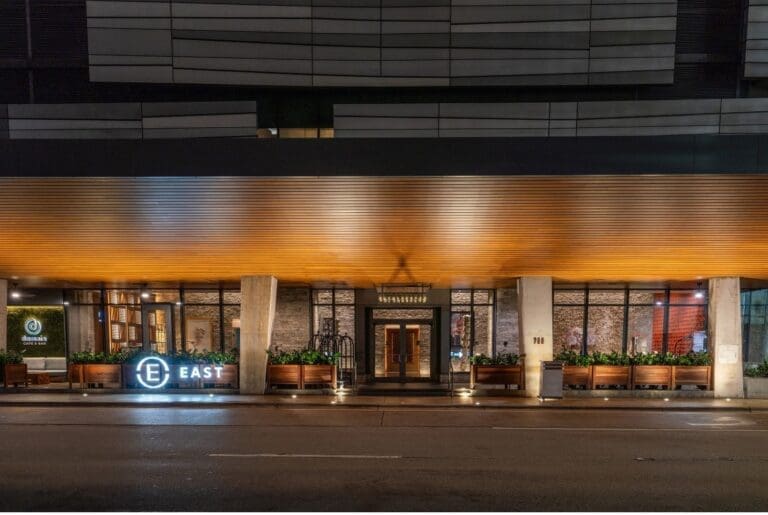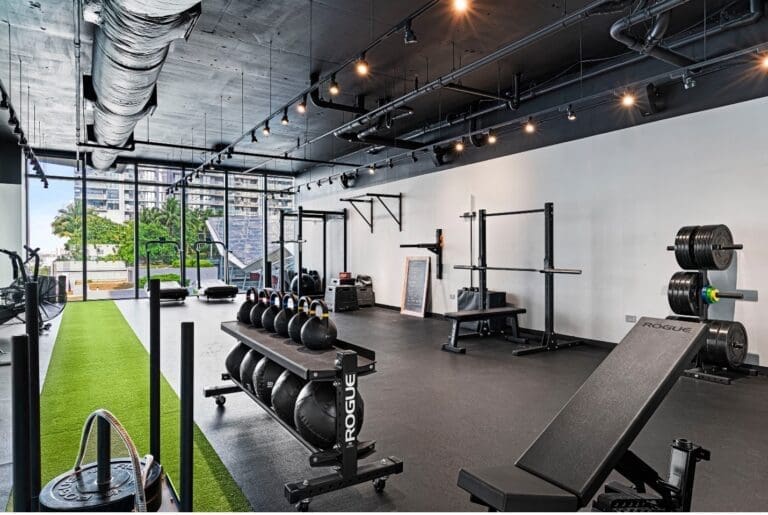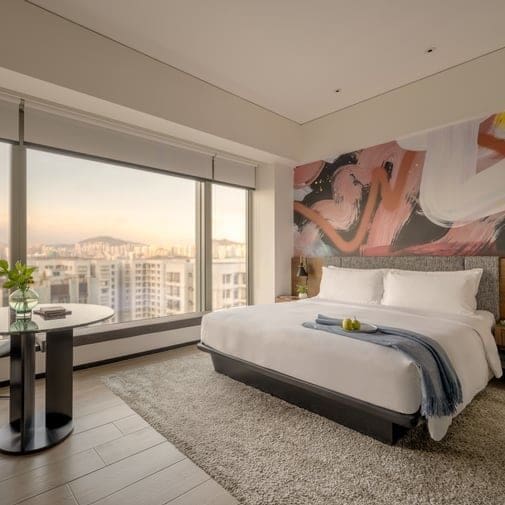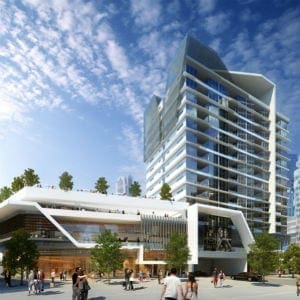The story of an urban hotel is the story of a city. The two move in stride, with the hospitality industry offering a home and a helpful hand to visitors while also providing dining and drinking hotspots that enable newcomers to evolve into lasting denizens of the locale. In this case study, EAST Miami (operated by Swire Hotels) that first opened in 2016 has grown to be the cultural steward for the booming neighborhood in Miami that is Brickell, presenting a picture of where hotel trends in luxury amenities, branding and customer mindsets are headed.

When examining scenarios like that of the construction renaissance currently underway in this ‘New Miami’, it would be all too easy to look back in retrospect at the macroeconomic forces and argue that any big box, value-engineered hotel would work here. Instead, EAST Miami rises above this constant push for owner risk aversiveness by creating a mixed-use architectural icon with dynamic amenities and strong onsite teams to support those amenities.
After staying there and experiencing it all, one can easily understand how this hotel – and the progressive brand that is EAST Hotels – will play host to locals, residents and overnight guests for decades to come. Significantly, the brand is tapping into a powerful post-pandemic trend by directly appealing to an emerging psychographic labeled as ‘alternative thinkers’.
Setting the scene for the new Miami
The allure of Miami has existed for over a century, both as a gateway to Latin America and the Caribbean, and then, with the advent of cheap air conditioning, for retirees eager to trade in their winter coats for sunscreen. Outside of the commercial real estate boom of the 1980s, much of the residential and hospitality growth has been centered around the beach communities, from South Beach up to Bal Harbour then even further to Fort Lauderdale and Palm Beach.
The revivalist of gleaming condominium and office towers first arrived in the late aughts as the momentum of the national housing boom in the 2000s shifted to demand for apartment units in sunny, hot climates. Much of these projects came online right as the GFC hit, so the next phase of construction along the intracoastal didn’t get properly underway until the market recovered nearly a decade later. Despite the tumult circa 2008 to 2012 for developers, Miami offers several inescapable advantages that make demand resistant to secular downturns.
As aforementioned, the beaches combined with great weather (barring a few hurricanes and soupy summer heat) and being within a three-hour flight to over half of the United States make the city a perennial destination of choice for vacationers and business owners. For the ladder group, the favorable state taxes are definitely a plus. Miami’s Spanish heritage and proximity to the Latin world have imbued the city with a multicultural flair. And surprisingly, it’s also host to numerous Europeans lured in as snowbirds and entrepreneurs.
With this as its canvas, Swire Properties, the parent company of operator Swire Hotels as well as both the EAST Hotels and The House Collective brands, saw the vision in the early 2010s to redefine the neighborhood of Brickell just across the Miami River from the downtown area, which at the time was still rather sleepy. The result became the Brickell City Centre, a layered and covered outdoor mall and office plaza that has won numerous awards for its architectural and urban planning accomplishments as well as for its LEED design.
Embedded in this 2.5-million-square-foot megaproject is the 352-key – with 89 residences – EAST Miami, which tops off at 40 stories. Since its opening, ultramodern skyscrapers have popped up all around, and after a brief hiccup during the pandemic, the Wall Street South movement has brought even more demand for residential units and short-term accommodations to the area. In fact, they can’t seem to build fast enough in Brickell; AAA office space is fully leased up despite troubles in commercial real estate across the rest of the country, and many other chic hotel projects are in the pipeline such as the 77-story, ultraluxury Baccarat Residences in presales and the supertall, 100-story Waldorf Astoria Hotel & Residences Miami. All this speaks to the boom, with EAST Miami’s residences often playing host to incoming executives for months or even years while they find permanent living arrangements.
Defining Brickell through extraordinary amenities
Today, the tourists are still concentrated across the causeway in Miami Beach, but many locals and young entrepreneurs live and work wholly within this one neighborhood of twenty square blocks, shopping at the Brickell City Centre and enjoying one of the EAST Miami’s vibrant food outlets – the signature restaurant, Quinto on the fifth floor and Domain Café in the lobby, as well as the Balinese-themed rooftop bar, Sugar, and the Hong Kong-themed speakeasy next to it, Tea Room.
Building a hotel that stands the test of time and grows a community that blends locals and visitors requires a thoughtful vision and meticulous area planning. Aside from direct access from the lobby to the Brickell City Centre that generates steady flowthrough traffic, the first standout on the design front is the expansive fifth floor. This master planning stroke of genius features Quinto which totals 4,500 square feet of indoor and 5,500 square feet of outdoor space that seamlessly wraps around into the tranquil, jungle-themed North Deck with rustic, alcove seating arrangements, and the 8,600-square-foot pool area that’s also sheltered by high walls and forested gardens.
Moving up to the seventh floor is where one finds the 24/7 gym, Body by EAST, and adjoining private exercise class studio, EASTudio. A personal gripe of ours, many hotels claim to have a fitness center as an amenity, but this is usually a small, dimly lit basement room with nonfunctional equipment. Contrary to this dated standard, EAST understands that modern sensibilities are far greater; many guests want to stay active while traveling, with gyms representing a top feature for selecting one property over another. Not just that, but high-end gyms are becoming the new third place, bringing people together through classes and gatherings.
Last of note, the 38th and 39th are devoted to 14,000 square feet of meeting spaces that add strong experiential qualities through both the panoramas of floor-to-ceiling windows overlooking downtown, the bay and Miami Beach beyond, as well as flexible, artistic setups to satisfy any group capacity. Above, on the top 40th floor, are Sugar and Tea Room, with capacities of 172 and 122 respectively. Both of them are hotspots that are utterly packed with a mix of locals and out of towners every night of the week.

Food, furniture and focusing on the guest’s needs
The story of a hotel is the story of a city, but it’s also the story of the people that make the hotel happen. At the heart of operations at EAST Miami is Richard Fernandez, Hotel Manager, who we were honored to sit down with for a lengthy chat over nonstop cortaditos – a Cuban coffee specialty made from a shot of espresso with steamed milk – touching on all things hospitality and, in particular, the EAST ethos.
What Fernandez emphasized is a striking takeaway that rings true for any hotel, anywhere in the world. Every person wants to feel as if they are in control, and yet when they travel and come to a hotel, there is an underlying vulnerability because they’ve lost a sense of personal control over the situation. This harks back to Maslow’s hierarchy of needs. Unlike, for instance, if something breaks in your own house, an inability to remedy a situation can cause deflation or anger.
Hence, when something goes wrong, a guest may appear mad at the hotel team, but they are actually frustrated at the situation because they are not in control of the outcome. Fernandez has instructed his teams to understand this psychological context and focus on the guest’s core needs in order to reassure them through calm communication. While onsite, you can see this and other facets that are the foundation of the strong service culture that the brand exudes.
Besides timeless lessons, Fernandez remarked that for a hotel to feel lively it must be alive. You need to constantly refresh spaces and reinvent the presentation in order to keep offering excellent service. Two areas that reflect this are the furniture and the food.
“At our hotel, we celebrate the natural beauty of wood, found in many of our public spaces and rooms,” commented Fernandez. “These timeless pieces, from tables and chairs to dressers and nightstands, gain character with age. Instead of discarding them, our expert craftsmen breathe new life into each one, revitalizing, reusing and repurposing wood throughout the hotel. This approach preserves their charm, reduces waste and contributes to a more sustainable future. It’s not about replacing the old—it’s about cherishing its story and letting it continue in new and inspiring ways.”
Sustainability is becoming a core effort for many hotel brands, but this is often hard for the guest to see without navigating to the ESG page buried in the website footer. Instead, the EAST Miami team rotates the refurbished wood pieces through the public spaces in the same way that they periodically refresh the artist exhibitions in the lobby next to Domain – visible to all who enter.
This tells the story of sustainability to guests while keeping areas feeling new. Behind the scenes, though, this onsite woodworking program has emerged organically, where the expert craftsmen are members of the engineering team who are allowed to explore their personal passions. To draw on Maslow’s hierarchy of needs, this is a method to facilitate self-actualization and team retention.
Shifting to food, we see the emergence of heightened sustainability yet again with a dedicated effort to source locally, and not just for Florida oranges. For example, Quinto sources mushrooms from Gratitude Garden Farm in Palm Beach County for a popular vegan dish, hongos rostizados, and the hotel has partnered with a local ice cream company, Aubi & Ramsa, to supply boozy (and non-boozy) ice cream at several on-prem food outlets as well as for the residence minibars.
Then, of course, the breads, pastries and cookies down at Domain and elsewhere are all baked fresh daily – an operational feat, as Fernandez noted, for a hotel of this scale. Dedicated to locavorism through both in-kitchen creations and regional procurement is yet one more way that the hotel has differentiated its offering in a tangible way to all guests.
Finally, EAST Miami has just recently appointed Andrew Zarzosa as its new executive chef. As a Miami native Zarzosa’s career spans several continents and leading luxury brands, promising yet more innovation on the food front, as well as perhaps a whole new culinary style that’s brings together all the various cultures that have converged on this New Miami.
Progressive hotel brands for the modern mindset
We’ve labeled EAST Hotels as a ‘progressive’ brand because its hotels embody the contemporary guest mindset that’s taking shape in the post-pandemic world. Described by EAST as ‘alternative thinkers’, these are people who strive for work-life balance amidst the hustle of our hyperconnected world by seeking extraordinary experiences and communities that share their identities.
Transcending demographics, these individuals can be anywhere from late boomers and Gen X to millennials or Gen Z; they also often have jobs in growing, tech-centric industries and are able to work remote or have flexible office arrangements. These guests value sustainability and wellness, although they are often too busy to fit in a full spa day so are looking for shorter time commitments like fitness classes or joining a run club.
What we see throughout is how the EAST Miami facilities the new commerce of Brickell around it by playing host to so many of these alternative thinkers. And this dynamic interaction between multiple parties can only be achieved by thinking in terms of mixed use: spacious hotel rooms for transient visitors, branded residences for remote workers or temporary relocations, and the public spaces or shopping center next door for everyone.
While it’s easy to look back at century-old storybook hotels to observe how they’ve stewarded their environs into renowned neighborhoods, it’s rarer to witness this happen in real time. EAST Miami is at the epicenter of the next phase of construction that will redefine the city, and it’s worth checking out to see for yourself and to experience a future-forward hotel brand.


















